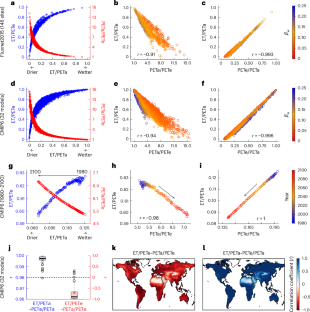Neglecting land–atmosphere feedbacks overestimates climate-driven increases in evapotranspiration
IF 27.1
1区 地球科学
Q1 ENVIRONMENTAL SCIENCES
引用次数: 0
Abstract
Accurate projections of evapotranspiration (ET) are crucial for understanding hydrological responses to climate warming, which remain highly uncertain because of complex land–atmosphere interactions. Here we develop a theoretical framework to disentangle these interactions, achieving highly consistent ET projections between offline and coupled models. Our findings show that previous estimates of climate-driven ET increases have been exaggerated, primarily due to a substantial overestimation of atmospheric evaporative demand. Notably, the atmospheric conditions often assumed to drive ET are, in fact, responses to ET changes induced by soil moisture and vegetation dynamics. Neglecting these land–atmosphere feedbacks has led to a 25–39% overestimation of climate-driven global ET increases and a 77–121% exaggeration of the negative contribution from land surface changes. These biases have caused large discrepancies in hydrological projections and attributions between offline and coupled models, underscoring the importance of accurately representing land–atmosphere interactions to improve the reliability and consistency of future hydrological projections. How evapotranspiration changes with warming is not well understood. Here the authors show that when often-neglected land–atmosphere feedbacks are considered, evapotranspiration increases less than currently projected by offline models.


忽略陆地-大气反馈高估了气候驱动的蒸散量增加
蒸散发(ET)的准确预估对于理解气候变暖的水文响应至关重要,但由于复杂的陆地-大气相互作用,蒸散发的水文响应仍然高度不确定。在这里,我们开发了一个理论框架来解开这些相互作用,在离线和耦合模型之间实现高度一致的ET预测。我们的研究结果表明,以前对气候驱动的ET增加的估计被夸大了,这主要是由于对大气蒸发需求的严重高估。值得注意的是,通常认为驱动ET的大气条件实际上是对土壤湿度和植被动态引起的ET变化的响应。忽略这些陆地-大气反馈导致对气候驱动的全球ET增加高估了25-39%,对陆地表面变化的负贡献高估了77-121%。这些偏差造成了离线和耦合模型之间水文预估和归因的巨大差异,强调了准确表示陆地-大气相互作用对提高未来水文预估的可靠性和一致性的重要性。
本文章由计算机程序翻译,如有差异,请以英文原文为准。
求助全文
约1分钟内获得全文
求助全文
来源期刊

Nature Climate Change
ENVIRONMENTAL SCIENCES-METEOROLOGY & ATMOSPHERIC SCIENCES
CiteScore
40.30
自引率
1.60%
发文量
267
审稿时长
4-8 weeks
期刊介绍:
Nature Climate Change is dedicated to addressing the scientific challenge of understanding Earth's changing climate and its societal implications. As a monthly journal, it publishes significant and cutting-edge research on the nature, causes, and impacts of global climate change, as well as its implications for the economy, policy, and the world at large.
The journal publishes original research spanning the natural and social sciences, synthesizing interdisciplinary research to provide a comprehensive understanding of climate change. It upholds the high standards set by all Nature-branded journals, ensuring top-tier original research through a fair and rigorous review process, broad readership access, high standards of copy editing and production, rapid publication, and independence from academic societies and other vested interests.
Nature Climate Change serves as a platform for discussion among experts, publishing opinion, analysis, and review articles. It also features Research Highlights to highlight important developments in the field and original reporting from renowned science journalists in the form of feature articles.
Topics covered in the journal include adaptation, atmospheric science, ecology, economics, energy, impacts and vulnerability, mitigation, oceanography, policy, sociology, and sustainability, among others.
 求助内容:
求助内容: 应助结果提醒方式:
应助结果提醒方式:


